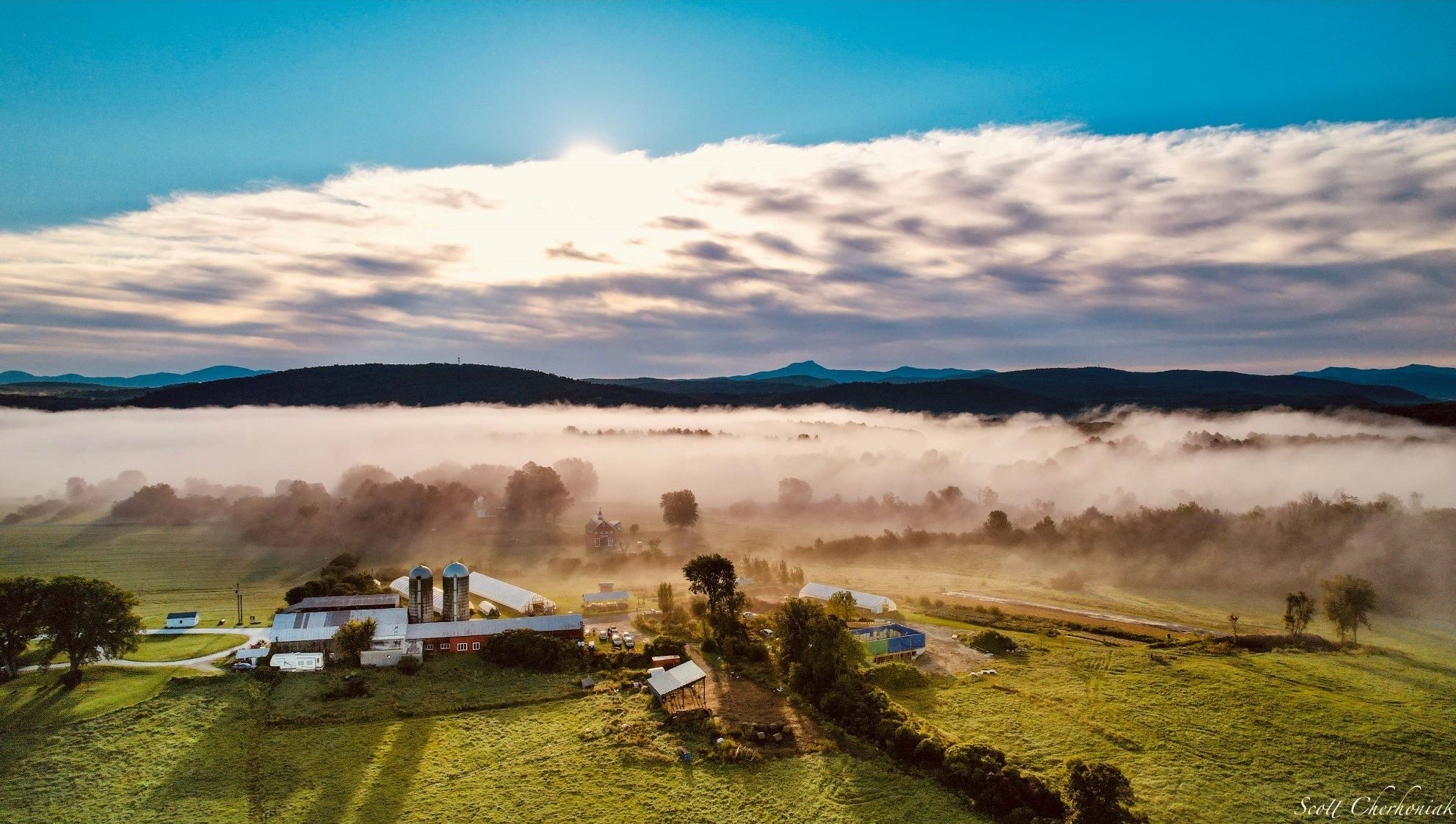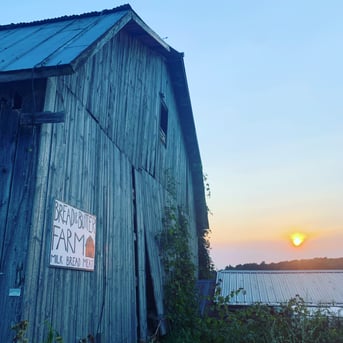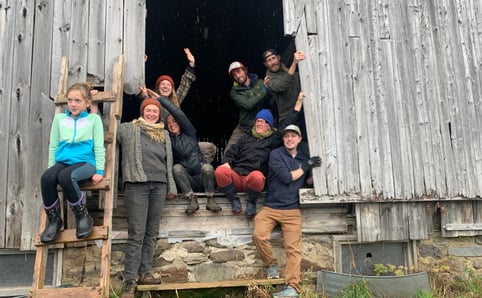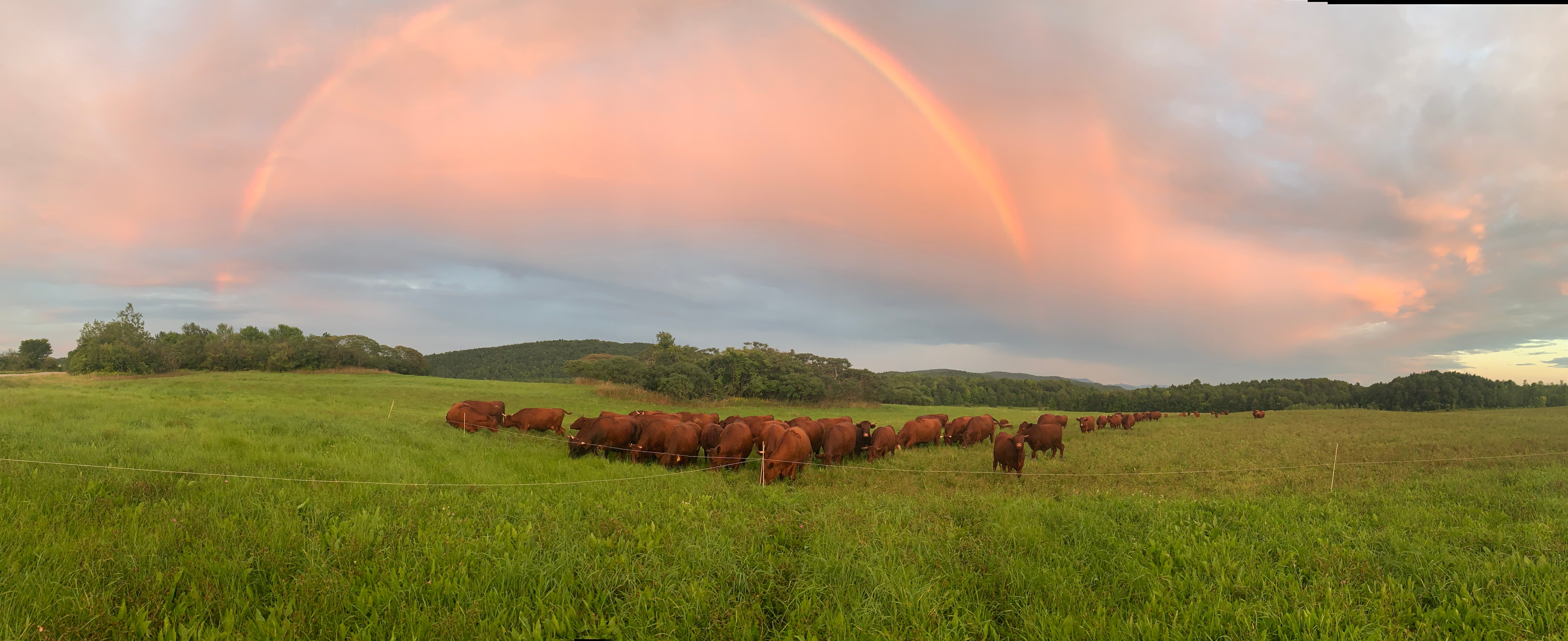Practical Activist Q&A featuring Corie Pierce, Bread & Butter Farm
- Bluestone Staff
- October 29, 2021
Featured image: Corie Pierce conversing with her cows
Corie Pierce is a farmer, educator and steward of the land. She is the owner and operator of one of our team’s favorite local farms, Bread & Butter Farm in South Burlington/ Shelburne, Vermont. Bread & Butter is a 200-acre, diversified farm producing grass-fed beef, pastured raised pork, and organic vegetables, specializing in growing greens all winter long in unheated, passive solar greenhouses. At the heart of Bread & Butter is a collaborative spirit that connects people and cultivates respect and reverence for the soil, plants and animals. We had the opportunity to talk to Corie about the team at Bread & Butter, their shared vision for the future and their Save the Barn campaign.

An aerial view of Bread and Butter Farm by photographer Scott Cherhoniak
Highlights from our conversation with Corie:
On Community
"It’s not just about building the land, but also building the human community too. We need to build a sustainable way of life for our farmers, one that can involve people being able to take a break and take a vacation and support young mothers when they have their first children.”
On Commitment
"Learn what land stewardship really is and understand the impact of subsidized industrial agriculture which is much of what you find in your grocery store. Make the long-term commitment to local, organic, sustainably-raised food, not just during a crisis like the pandemic.”
On Curiosity
“I was an “outdoorsy kid” and one of my earliest memories was literally asking myself: “why are people so removed from nature?”
On Continuity
“We don’t claim to know what we’re doing or think we have all the answers, but our goal is to look at all the components: food, health & wellness, art, music, spirituality and that all of that is rooted in our daily lives. When I retire (whatever that is), I want to live and die here and see this flourish long after I am gone.”
Our Conversation with Corie
Q: Where did your love of farming begin?
A: I grew up in New Hampshire and my grandparents were up in the Northeast Kingdom. My parents were teachers so they had the summers off and we would spend our summers up in Vermont and I fell in love with it. One set of grandparents had a farm in Peacham, a modest old farm with 100 acres, and I spent a lot of my childhood there, sinking into that land and spending time in my grandmother’s garden. I was an “outdoorsy kid” and one of my earliest memories was literally asking myself: “why are people so removed from nature?” I was so drawn to nature and wanted to be in nature in every way. I remember asking: “why do we need cities and giant buildings and these large homes?” I’ve grappled with that my whole life.
I started working on a farm in New Hampshire as teenager for seven full seasons, back then farming was seen as “lowly” work which I didn’t understand. I instantly fell in love with it...the hard work, being outside, and working with a family. It was a multi-generational farm and they became dear friends and mentors. I went to college, but the farm was where I learned the important things: from science to work ethic and working with a team and figuring out where’s my place in life and what do I want to do in life. And I remember thinking: “why didn’t anyone tell me I could do this as a career?” So, I actually kind of kept it on the “DL” for years because I didn’t want anyone to talk me out of it. I had one teacher that I actually told and that was after college. I told him the vision that I had for this educational farm and he was immediately supportive, and that was just the spark I needed to believe that it was more than a dream.
Q: What led you to start Bread and Butter farm?
A: After college I had debt to pay off, and I moved to California and worked for some educational companies there, and I had the farm in my mind still as a dream. Then, I went to Santa Cruz which has a six-month farmer training program where you live in tent and you all cook food together. It was perfect for me. It brought me to a community of other farmers and really expanded my perspective. I met my original business partner for Bread & Butter at that program. After that I found a job at Michigan State University to help them develop an educational organic farming program. It was 50/50 split between running their farm and creating a program, and then launching it and teaching it.
I remember reading the job description and saying: “Is someone playing a joke on me?” This is too perfect. I met my partner the first day I was there. It was all very serendipitous. We had our first child and then I knew I wanted a farm and I wanted to come back here to Vermont or to the farm where I started in New Hampshire. I got a job at Sterling College which was a perfect bridge to get back here, and the guy I met at the Santa Cruz program was already back in Vermont farming and we had talked about a co-operative, collaborative farm. So, first, it was really just getting back here and daydreaming and envisioning what we wanted. Right as we were ready to move back to Vermont, the Vermont Land Trust posted this farm. So, we scrambled to put together a business plan to show the viability of our vision for the farm. We bought 143 acres with a conservation easement on it...so we own the land, but there’s a lot of restrictions of what we can’t do which is mostly development. This is a $2million dollar property and we bought it for $225,000. It didn’t come with a house, so we still had to figure out housing which has been a challenge. We launched the dream 12 years ago and have been building it ever since. So much has happened and we’ve learned so much, but I still feel like we’re in our infancy.
Q: Right now, you have a Save the Barn campaign that you’re working on. How’s it going?
 A: We are so honored and humbled by the response and generosity of the campaign so far. We created this GoFundMe to provide matching funds for a grant we hope to receive in the amount of $15,000. Since this grant program is highly competitive, we aren’t guaranteed to win these funds. We would dearly love to restore our Old Barn in the way she deserves. So, we have decided to increase the goal of our GoFundMe to $25,000 which would provide some stability to our restoration plans, in case we do not receive the matching grant. If we do receive the grant, we will be able to do so much with these funds! The infrastructure needs on an old farm are substantial. We’ve put everything together on a shoe-string. You can be sure that there’s no frivolous money here.
A: We are so honored and humbled by the response and generosity of the campaign so far. We created this GoFundMe to provide matching funds for a grant we hope to receive in the amount of $15,000. Since this grant program is highly competitive, we aren’t guaranteed to win these funds. We would dearly love to restore our Old Barn in the way she deserves. So, we have decided to increase the goal of our GoFundMe to $25,000 which would provide some stability to our restoration plans, in case we do not receive the matching grant. If we do receive the grant, we will be able to do so much with these funds! The infrastructure needs on an old farm are substantial. We’ve put everything together on a shoe-string. You can be sure that there’s no frivolous money here.
Q: There is so much happening at Bread & Butter – education programs, Blank Page Café, your CSAs and online farm store, farmer training, and music with your partner, Mister Chris. Talk about your approach to farming and how it’s different from what many people may imagine.
A: What we’re trying to do here is putting humans squarely involved within the landscape as a community, so the people who are coming here are truly experiencing it, and the people who are working here are embodying that. I believe that work is love in action. A mentor said that to me long ago. We want to mimic the natural ecosystems to grow and raise food that is a net-add to this land and this ecosystem. This is not an extractive business...it’s got to be here for generations to come. It’s not just about building the land, but also building the human community too. We need to build a sustainable way of life for our farmers, one that can involve people being able to take a break and take a vacation and support young mothers when they have their first children. The educational component of the farm is important too because it brings kids and their parents here and reconnects them to the natural ecosystem. We are so disconnected from the land and if we don’t figure it out, we lose something that is so intrinsic to who we are.
When it comes to the animals on our farm, we keep them all together to mimic a wild bison herd. We are keeping them safe and letting them be a family that teaches each other how to be good grazers and we just shepherd them along. We talk a lot about that with the human community too...we are deficient of elders. We want to build back that family element of multi-generation. We don’t' have the elders teaching us so we’re figuring things out on our way. It will get better every generation. My kids were born here and we’ve had another baby born here, too...so it’s a start
We don’t claim to know what we’re doing or think we have all the answers, but our goal is to look at all the components: food, health & wellness, art, music, spirituality and that all of that is rooted in our daily lives. When I retire (whatever that is), I want to live and die here and see this flourish long after I am gone. Obviously, these are concepts aren’t new, they’re from indigenous people and we are in humble gratitude to try to get back to that.
Q: Talk about the team at Bread and Butter.
 A: We have a great crew who are all in, and we never have a hard time finding workers and it’s definitely not the pay. We allow people to create and be part of the creation and management of what we're envisioning. Brandon and Steph live here on the farm and they have two kids. Brandon is the land and animal manager and we met at Sterling College. His wife, Steph is a nurse and very involved in the farm. Bekah and her husband Eric met here on the farm and she was a key part of building the educational programs here. Alex is managing our village school program. Mike runs Blank Page Café. Mike was part of the 2013 co-hort in the UVM farmer training program that we participate in. My original business partner had a bakery on the farm and he moved off the farm in 2015, and the space was available and Mike saw the opportunity. He bakes and also makes amazing meals which are the real deal in every way. I’d like our farm to be a cooperative in the future...and while we haven’t been ready to make that leap, our decision-making does happen cooperatively and that’s part of why people love being here. My partner, Chris, runs his music program here. So, Mike’s business and the music and the farm all work synergistically together. We’re working together to support each other and the health of each of our businesses. We all sink or swim together.
A: We have a great crew who are all in, and we never have a hard time finding workers and it’s definitely not the pay. We allow people to create and be part of the creation and management of what we're envisioning. Brandon and Steph live here on the farm and they have two kids. Brandon is the land and animal manager and we met at Sterling College. His wife, Steph is a nurse and very involved in the farm. Bekah and her husband Eric met here on the farm and she was a key part of building the educational programs here. Alex is managing our village school program. Mike runs Blank Page Café. Mike was part of the 2013 co-hort in the UVM farmer training program that we participate in. My original business partner had a bakery on the farm and he moved off the farm in 2015, and the space was available and Mike saw the opportunity. He bakes and also makes amazing meals which are the real deal in every way. I’d like our farm to be a cooperative in the future...and while we haven’t been ready to make that leap, our decision-making does happen cooperatively and that’s part of why people love being here. My partner, Chris, runs his music program here. So, Mike’s business and the music and the farm all work synergistically together. We’re working together to support each other and the health of each of our businesses. We all sink or swim together.
One thing that I think about a lot is how to keep young farmers. They need stability, pay and housing and knowing they can be supported if they have kids. We want to create a model that really supports that and can be replicable. It’s hard work, but it's also fun to create and we’re all inspired to be part of that creation.
Q: What are the kinds of partnerships that bring Bread and Butter to life?
A: We had a lot of partnerships before, but when the pandemic hit because of our location we had a lot of people looking for food here. Our CSA program just exploded and we didn’t have the capacity to suddenly grow four times as much food. So, that’s where our relationships with other farms became really important. Tamarack Hollow Farm’s market was farmer’s markets in New York City and then selling to restaurants, so during COVID, they needed new outlets. So, that worked for us because we could buy their produce and sell it here. There was a lot of that in Vermont with farmers working together. I’d say right now, we are buying products from 25 different farms and producers. For example, we sell dairy products, cheeses and ferments that we don’t produce here.

A little rainbow magic at Bread and Butter Farm
Regarding organizations, Vermont Land Trust has been huge for us and Dirt Capital. We have these 400 acres that we’re working on putting into a commonly held land ownership model. That farm went up for sale in 2017 for $3 million and we said: “We’ve got to figure out how to buy this.” Dirt Capital buys land quickly for farms and then works to conserve it and work out how the farmer can ultimately buy it from them. So, right now, that land is being held by Vermont Land Trust, Dirt Capital and the City of South Burlington so the land will be conserved and ultimately our plan is to have 99-year lease on the land to manage it and bring the soil on it back to life.
Q: What do you want people to understand most about the agricultural crisis in our country? If you could get people in your community to do one or two specific things to ensure healthy, viable food systems in their communities...what would you ask them to do?
A: Learn what land stewardship really is and understand the impact of subsidized industrial agriculture which is pretty much everything in your grocery store. Make the long-term commitment to local organic, sustainably-raised food, not just during a crisis like the pandemic.
I’m on mission to share the importance of animals in our agricultural system. Animals and meat are getting such a terrible rap right now. I get it and I’m not pro-industrial animal agriculture, just like I’m not pro-industrial tillage and crop production. We’ve devastated our country with tillage, and we also need animals on the land like we need air. The “don’t eat meat” agenda doesn’t look at the holistic role that animals play and their part in soil rebuilding. What we envision on our land is seven or eight species of animals living together on this landscape and being part of the ecosystem. With animals as part of the ecosystem, we will have land that will sustain us. People need to understand that meat is not the enemy when it is locally and sustainably produced. If you don’t want to eat meat, that’s fine, but understand the place that animals have to play in a healthy ecosystem. Understand that it was the 60 million bison that roamed our country that built the 16 feet of top soil that we have gotten rid of through tilling and plowing in the last two generations. We need to acknowledge that and stop putting the chemicals into the soil that are making everything worse.
Q: What inspires you as you begin each day?
A: The inspiration to me is the circadian rhythms and the rhythms of this planet and being humbled by sunrise and sunset. I am guided by the beauty around me and all the people who are doing this work every day.
Bluestone policies support nonprofits like NOFA-VT and the Vermont Land Trust that are working for our farms, forests and future. Bluestone encourages the Practical Activist in all of us to get involved in your community, support local farmers and organizations that are creating solutions every day for healthier, local and sustainable food systems.
Here are a few of the other nonprofits in the 1% for the Planet network that are working for land stewardship, supporting farmers and educating people.
Like hearing about Practical Activists?
We’ll share their stories with you monthly. (No email overload… we promise!)


